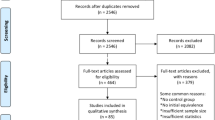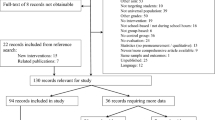Abstract
We developed and evaluated a school-based psychosocial prevention program for adolescents, focusing on self-esteem, negative cognitive processes, and peer isolation. Fifty-one tenth-grade students between the ages of 13–16 were recruited and randomly allocated to one of three groups; Social Cognitive Training group (SCT), Attention Placebo Comparison Group (APC) and a Waitlist Control group (WL). A pre-post design using two types of measures: specific measures of the target skills (self-esteem, self-statements) and impact measures (quality of peer relationships, acceptability of intervention for adolescents and teachers) evaluated the effectiveness and social validity of the intervention. Multivariate Analyses of Variance showed significant improvements on measures of target skills for the SCT group in contrast to the comparison conditions on reported self-esteem, and self statements, however mixed results were found on the impact measures. While the SCT group was rated as highly acceptable and useful by both adolescents and teachers, student self report ratings of quality of peer relationships showed little change across the study period. We discussed our findings in terms of the effectiveness of group based cognitive interventions in developing adolescent self-esteem and social competence, and the ecological validity of implementing programs within naturalistic settings.
Similar content being viewed by others
REFERENCES
Achenbach, T.M. (1991). Manual for the Youth Self Report and 1991 Profile. Burlington: University of Vermont Department of Psychiatry.
Australian Bureau of Statistics (1996). Directory of Census Statistics. Canberra, Australia: Commonwealth Government Publishing.
Bandura, A. (1986). The explanatory and predictive scope of self efficacy theory. Journal of Social and Clinical Psychology, 4, 359–373.
Barrett, P.M. (1995). Social skills training in a high school setting. Griffith University, Gold Coast, Australia: Unpublished Manuscript.
Bierman, K.L., & Furman, W. (1984). The effects of social skills training and peer involvement on the social adjustment of preadolescents. Child Development, 55, 151–162.
Blonk, R.W.B., Prins, P.J.M., Sergent, J.A., & Ringrose, J. (1996). Cognitive-behavioral group therapy for socially incompetent children: short term and maintenance effects with a clinical sample. Journal of Clinical Child Psychology, 25, 215–224.
Bulkeley, R., & Cramer, D. (1990). Social skills training with young adolescence. Journal of Youth and Adolescence, 19, 451–463.
Cavell, T.A. (1990). Social adjustment, social performance, and social skills: A tri-component model of social competence. Journal of Clinical Child Psychology, 19, 111–121.
Christopher, J.S., Nangle, D.W., & Hansen, J. (1993). Social skill interventions with adolescents—current issues and procedures. Behaviour Modification, 17, 314–338.
Chui, L. (1988). Measures of self-esteem for school age children. Journal of Counseling and Development, 66, 298–301.
Coie, J.D., Dodge, K.A & Kupersmidt, J. (1990). Group behaviour and social status. In S.R. Asher & J.D. Coie (Eds.), Peer Rejection in Childhood (pp. 17–59). Cambridge: Cambridge University Press.
Dadds, M., Spence, S.H., Holland, D., Barrett, P.M., & Laurens, K. (1997). Prevention and early intervention for anxiety disorders: A controlled trial. Journal of Consulting and Clinical Psychology, 65, 527–635.
Delamater, R.J. & McNamara, J.R. (1986). The social impact of assertiveness: research findings and clinical implications. Behavioral Modification, 10, 139–158.
Eitzen, D.S. (1975). The effects of behaviour modification on the attitude of delinquents. Behaviour Research and Therapy, 13, 295–299.
Glass, C.R., Merluzzi, T.V., Biever, J.L., & Larsen, K.H. (1982). Cognitive assessment of social anxiety: Development and validation of a self statement questionnaire. Cognitive Therapy and Research, 6, 37–55.
Gresham, F.M. (1985). Utility of cognitive behavioural procedures for the social skills training with children: A review. Journal of Abnormal Child Psychology, 13, 411–423.
Gurney, P. (1986). Self esteem in the classroom. School Psychology International, 7, 199–209.
Hagborg, W. (1993). The Rosenberg self esteem scale and Harter's self perception profile for adolescents: A concurrent validity study. Psychological Review, 30, 132–136.
Heimberg, R.G. (1989). Cognitive restructuring methods in the treatment of social phobia. Cognitive Therapy and Research, 9, 436–445.
Hughes, J.W., & Sullivan, K.A. (1988). Outcome assessment in social skills training with children: A review. Journal of School Psychology, 26, 167–183.
Jupp, J.J., & Griffiths, M.D. (1990). Self concept changes in shy, socially isolated adolescents following social skills training emphasizing role plays. Australian Psychologist, 25, 165–177.
Kazdin, A.E., (1990). Childhood depression. Journal of Child Psychology and Psychiatry, 31, 121–160.
King, C., Naylor, M., Segal, H., Evans, T. & Shain, B. (1993). Global self worth, specific self perceptions of competence and depression in adolescents. Journal of American Academy of Child Adolescent Psychiatry, 32, 745–752.
Ladd, G.W & Mize, J. (1983). A cognitive Social Learning Model of Social skills Training. Psychological Review, 90, 127–157.
LaGreca, A.M. & Santagrossi, D.A. (1980). Social skills training with elementary school students. A behavioural group approach. Journal of Consulting & Clinical Psychology, 48, 220–227.
Mannarino, A.P., Christy, M. Durlak, J.A., & Magnussen, M.G. (1982). Evaluation of social competence training in the schools. Journal of School Psychology, 20, 11–18.
Maxwell, B.E. (1992). Hostility, depression, and self esteem among troubled and homeless adolescents in crisis. Journal of Youth and Adolescence, 21, 139–150.
McCarthy & Hoge (1982). Analysis of age effects in longitudinal studies of adolescent self-esteem. Developmental Psychology, 18, 372–379.
McFarlane, A.H., Bellissimo., A., & Norman., G.R. (1995). The role of family and peers in social self-efficacy: Links to depression in adolescence. American Journal of Orthopsychiatry, 65, 402–410.
Oglivy, C.M. (1994). Social skills training with children and adolescents: A review of the evidence on effectiveness. Educational Psychology, 14, 73–83.
Overholster, J.C., Adams, D.M., Lehnert K.L., & Brinkman, D.C. (1995). Self esteem deficits and suicidal tendencies among adolescents. Journal of American Academy of Child Adolescent Psychiatry, 34, 919–928.
Rosenberg, M. (1965). Society and the Adolescent self-image. Princeton, NJ: Princeton University.
Rosenberg, M. (1986). Conceiving the self. Melbourne, FL: Krieger.
Smart, R.G. & Walsh, G.W. (1993). Predictors of depression in street youth. Adolescence, 28, 41–53.
Spence, S.H. (in press). Enhancing social competence with children and adolescence. Windsor: NFER Nelson.
Tisdell, D.A., & St. Lawrence, J.S. (1988). Adolescent interpersonal problem solving skill training: Social validation and generalisation. Behaviour Therapy, 19, 171–182.
Verduyn, C.M., Lord, W., & Forrest, G.C. (1990). Social skills training in schools: An evaluation study. Journal of Adolescence, 13, 3–16.
Warren, R., McLellarn, R.W. & Ponzoha, C. (1988). Rational emotive therapy vs general cognitive behavioural therapy in the treatment of low self esteem and related emotional disturbances. Cognitive Therapy & Research, 12, 21–37.
Wolf, M.M. (1978). Social validity: the case for subjective measurement or how applied behaviour analysis is finding it's heart. Journal of Applied Behaviour Analysis, 11, 203–214.
Author information
Authors and Affiliations
Corresponding author
Rights and permissions
About this article
Cite this article
Barrett, P.M., Webster, H.M. & Wallis, J.R. Adolescent Self-Esteem and Cognitive Skills Training: A School-Based Intervention. Journal of Child and Family Studies 8, 217–227 (1999). https://doi.org/10.1023/A:1022044119273
Issue Date:
DOI: https://doi.org/10.1023/A:1022044119273




